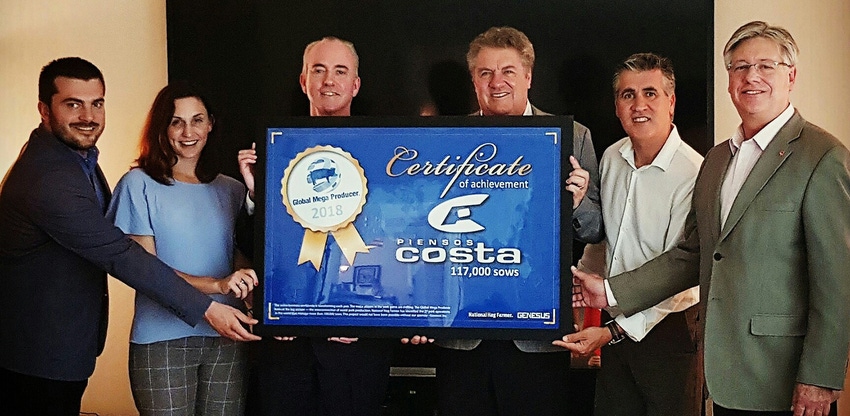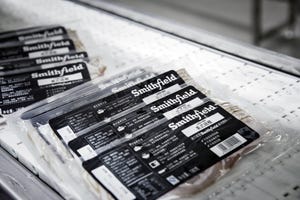A Q&A with Jorge Costa, CEO and president of Piensos Costa, who stresses quality and sustainability.

Can you please provide a little history about the family and starting up Piensos Costa, as well as where the business stands today?
The story of Costa Food Group is tied to setting up Piensos Costa in 1966. The business began as trading activity by buying and selling grain; since then, it has applied models of integration, expansion and growth that have allowed us to strengthen our position as a leader in the domestic and European agribusiness sector.
Today, Costa Food Group operates in 107 countries, with an aggregate turnover of 800 million euros in 2018.
The company structure is based on a mixed model, where several members of the family are involved in the management along with external professionals that are highly experienced in the sector. I am the global CEO and lead the family business, which also addresses other business areas such as viticulture, agro-chemistry and hotel chains.
You’ve increased your size since last year. What changes or additions have you made to the business?
During the last few years, we have been working on an expansion strategy based on a verticalintegration model with its origin in Piensos Costa. Back in 2016, we implemented this ambitious growth plan that materialized in the acquisition of strategic companies such as Costa Food Meat (a packing plant with a slaughterhouse and cutting room, 2016), Casademont (a traditional company focused on high-quality charcuterie, 2017) and Industrias Cárnicas Villar (a benchmark company in the meat industry with well-known brands that are highly valued by consumers, 2018).
The implementation of this strategy of vertical integration along with strengthening our pig production has allowed us to present such successful growth rates in recent years. Piensos Costa is now the second-largest swine producer in Spain.

What has been the key to success in growing your business?
The first issue in mind for Costa Food Group is to ensure the quality of its products throughout the entire production chain. The transparency and traceability that can be seen through the whole process are key to validating and accrediting the high quality of our products to our customers. All this is in addition to the sustainability and efficiency of our production processes, which historically have made Costa Food Group a leader in its sector.
Another key factor that has contributed to Costa Food’s success is operating under a consolidated economic model for population settled in rural areas. We are especially proud of being able to show that it is possible to generate economy and jobs in the countryside. More than 650 [owned and integrated] farms are distributed throughout Aragón, Cataluña, Navarra, and Castilla and León regions, often in small municipalities, favoring the settlement of families, that, in turn, demand different services at a local level. This vocation of trusted relationships, in the medium and long term, with its stakeholders, makes up one of the most recognizable trademarks of the group and generates opportunities to implement strategic and future projects.
What have been some of the challenges along the way?
Currently, our main challenge is focused on the consolidation of the integration model started in 2016, combining our experience and traditional know-how in the agri-food business with the current and future demands of consumers.
We are working on strengthening our presence in the international markets, in which our brands are already recognized, and also by bringing our Iberian pork products to broader international markets, where they have a very high development potential.
Finally, all these future projects are based on a great human team that continues to grow and strengthen, with the pride belonging to Costa Food Group. It’s a global brand, but Costa Food Group is close and committed to the region. We are a traditional but also innovative group, and operate under an ambitious leadership team.
What makes your business unique in Spain, as well as in the European Union?
We are one of the few groups in Spain that can guarantee the total control of its production, since we are fully integrated — from pig raising to final customer distribution.
This year we have achieved the AENOR’s Animal Welfare Certification, from the Spanish Association for Standardization and Certification [AENOR is an acronym for the Spanish translation of the association name], becoming the first “white pig” meat group in getting certified in the whole pork process, from our breeding farms to processing and packing. This recognition shows the commitment of our brands and our employees to animal welfare. Our concern for animal well-being does not depend just on one factor, as it requires constant supervision and monitoring alongside a process of continuous improvement.
At Costa Food Group, our commitment to welfare is based on caring for animals from a holistic point of view: good feeding, good housing conditions, good health and appropriate behavior. We maintain that the evaluation of animal welfare should focus on animals, rather than their handling, facilities or the production system.
Only in this way can we produce more sustainable and efficient models that will connect the Group with consumers through our strong existing commitment to caring for health, as well as maintaining our position as a leader in the meat industry.
What is your future outlook for your business? For the global market?
After 2017, which was extraordinary for the sector, we closed the year 2018 with very good results, managing to consolidate our Costa Food project. For 2019, prospects remain positive as demand continues to grow and even increase in certain international markets.
Our strategic lines for this year are focused on strengthening the integration model of our productive chain, especially after the acquisition of Industrias Cárnicas Villar, as well as working on fulfilling our commitment to the client, guaranteeing animal welfare in our more than 650 integrated farms.
The meat industry is undergoing many changes. Companies are becoming more integrated to form large groups to be able to offer to food distributors and ultimately to the final customer, a product that ensures total confidence in the production system in terms of traceability, quality, commitment and animal welfare while keeping a competitive market price.
This sector faces many challenges in the future, perhaps the most pressing is being able to respond to the dynamic changes in consumer habits and to continue to innovate in product development without forgetting our principles that have allowed us to develop a sustainable business in our territory, maintain population and generate employment in rural environments.
Translated by Fernando Ortiz-Hermida, Genesus Inc.
About the Author(s)
You May Also Like




